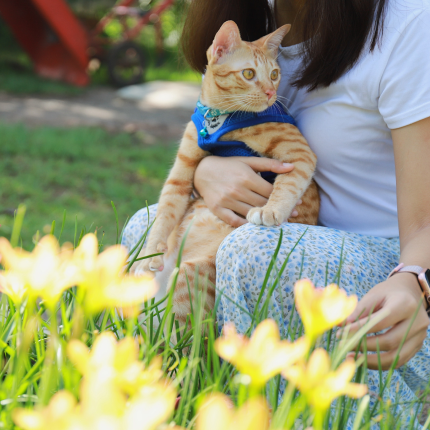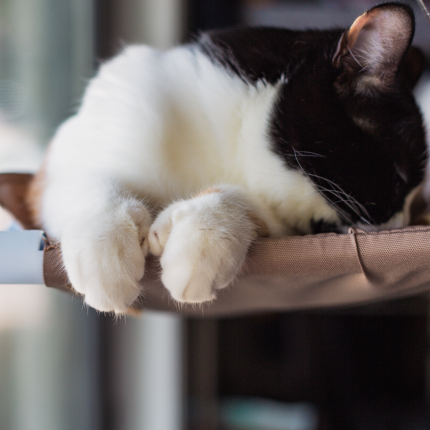How to Allow Your Indoor Cat Safely Experience the Outdoors

As a cat parent, you might feel guilty about never allowing your indoor cat outside, especially if she shows interest. But, unfortunately, most cats ‘ask’ to go outside without understanding what awaits them. Some pet parents alleviate this craving by creating a stimulating indoor environment for their cats by using enrichment activities, lots of windows, cat-friendly plants, and some outdoor solutions we’ll get to later.
As you probably already know, there are a lot of risks involved in letting your indoor cat go outside; your cat’s safety should always be your top concern. So here are some helpful tips for allowing your cat to explore the outdoors safely.
advertisement
Outdoor vs. indoor cats
Many cat rescues require potential adopters to keep their cats inside, and veterinarians recommend it — for good reason too. When it comes to your cat’s safety and well-being, a full-time indoor cat is typically the safest cat.
UC Davis Veterinary Medicine reports that indoor cats live much longer than outdoor cats. Indoor cats live an average of about 10 to 15 years, and outdoor cats live a much shorter average of two to five years. Cats can encounter many outdoor hazards, including parasites and diseases, fights with feral cats, cars, predators like coyotes, toxins, and other animals.
Your cat is protected from these potential harms when you keep them indoors. You also spend more time with your cat, which allows you to identify possible health issues sooner rather than later. Your cat is also less likely to get lost, picked up by animal control, or mistaken for a stray by other humans if you keep them inside. It’s also essential to protect natural wildlife since even well-fed cats hunt birds and other small prey for fun, which can seriously impact the wildlife around you. Annually, domestic cats kill over 2 billion birds in the US alone.
How to let your cat explore outdoors safely
By having access to a sunny windowsill, a cat who spends all her time inside can still enjoy the benefits of experiencing the outdoors. Hang a hammock bed in front of your cat’s favorite window so they can watch the birds and squirrels from a cozy spot. If you want to provide your kitty some extra entertainment, install a bird feeder. If the weather permits (and if you have a screen installed), open the window so she can enjoy the breeze.
If you still want to let your cat explore the outside, do it as safely as possible:
- Walking your cat outdoors with a harness and leash
- You can find a lot of roomy and secure outdoor cat enclosures online (you can create or buy a ‘catio’ or mesh cat enclosure).
- Remember to keep your cat up-to-date with flea/tick and heartworm medications, and tell your vet if your cat spends time outdoors so they can get the necessary yearly screenings.
- Supervise your cat’s outdoor time and never leave them unattended.
advertisement
Keep in mind: once you start exposing your cat to the outdoors, she may become more courageous about darting outside when a door is ajar. So be extra careful about leaving your doors open and double checking your cat is still in the house by shaking a container of treats and see if she comes running. The sooner you discover she escaped, the faster you’ll be able to find her.
There is a happy medium between keeping your cat indoors and letting her experience outdoor life. Depending on your cat’s personality, you may be successful in leash training your cat for walks and other outdoor adventures.
In either case, make safety your top priority and pay attention to your cat’s cues. Some cats may be perfectly content living indoors; others may be comfortable walking outdoors on a harness and leash or exploring a small patch of grass under your supervision. Keep your cat indoors when in doubt, and use common sense.

Featured Articles

Why Do Cats Roll Over Into Their Backs But Not Let You Touch Their Bellies?
It’s common knowledge dogs love to have their tummies rubbed when they freely lay down before you and roll onto their backs. But, if you’re also familiar with cats, you know that when they roll onto their backs with their bellies exposed, rubbing the belly will most likely result in…

Polydactyl Cats: Just More Beans to Love
Polydactyl cats have become extremely popular in recent times. As a result, more and more people are interested in learning more about this six-toed cat and want to get one of their own. If you are a cat lover intrigued by polydactyl cats, you have come to the right place….

The Odd-Eyed Cat (AKA Heterochromia)
Cats are already beautiful and fascinating creatures, but people are bound to take notice when they have something as captivating as two different colored eyes. Odd-eyed cats always have one blue eye paired with either a green, yellow, or brown eye. This form of heterochromia occurs in other animals, including…